Saturday, June 14, 2008
Hands
In order to avoid this in the future, I have this from an email I received this week.
The Fine Art of the Handshake
by Michael Dalton Johnson
Your handshake says a lot about you. It can convey confidence, warmth, and honesty, or it can signal weakness, uncertainty, and disinterest. Either way, it sends a subtle yet powerful message about who you are, that is not lost on prospective buyers. Use these pointers to make sure your handshake sends the right signals, and creates a good impression with prospects and customers.
Avoid the power grip. A handshake should be firm, but not overly forceful. Beware of the unconscious tendency to pull the other person toward you as you shake. This can be interpreted as aggressive, and the prospect's resistance to you may go up a notch or two.
Nothing wimpy. It may seem painfully obvious, but it's amazing how many salespeople offer weak, perfunctory handshakes. This is a major turnoff to many customers. Firm and friendly always wins the day.
Look 'em in the eye. As you extend your hand, establish eye contact and smile. Show some teeth! A warm and sincere greeting can make you an instant friend-and all things being equal, people prefer to buy from friends.
Get a grip. Never grasp just the other person's fingers. Take their entire hand completely in yours, and gently pump it two or three times.
Turn on the charm. You've been talking with a customer on the phone for several months, and meet them in person for the first time at a trade show. To express your pleasure at finally meeting face to face, you may want to cover his extended hand with your left hand briefly during the handshake. This increases the familiarity and warmth of the handshake. Do not attempt this with someone you don't know. However, it is often a pleasant gesture when you are shaking hands with someone you've met previously. It simply says, "I'm very glad to see you again."
What to say? No handshake is complete without a spoken greeting. You can't go wrong with, "It's a pleasure to meet you." When meeting someone of high rank, such as the chairman of the board or founder of a company, you may want to up the ante with, "It's a great pleasure to meet you." After the initial greeting, your conversation should begin while you are still shaking hands, for example, "John tells me you've made some significant additions to your product line." Your hand should be slowly and somewhat reluctantly withdrawn as the person begins to speak. This slow withdrawal indicates your keen interest in the person and what he is saying.
What's your body language saying? Posture is important, so stand erect, about three feet (one pace) away from the client, with your hands out of your pockets. Face the client squarely; never approach from an angle, or when the subject is engaged in conversation or otherwise distracted. Wait until you have his full attention before extending your hand.
Saying goodbye. When the meeting is over, it's time to shake hands again. You now have the opportunity to leave a lasting impression. If you've established rapport with the buyer, it's a good idea to gently grasp his right forearm with your left hand during the handshake, and restate any promises you may have made during the meeting, for example, "I'll put the report you requested in the mail to you today, and give you a call next Wednesday. I enjoyed meeting you." This two-handed shake signals your interest and commitment to your customer.
Practice makes perfect. Much like dancing, the fine art of the handshake takes practice. Stand before a mirror and extend your hand. Check to see if you're projecting an image of confidence, warmth, and enthusiasm. Remember, your handshake is a powerful business asset that can help you close more sales, and build lasting and profitable relationships. The time you spend working on it will be time well spent.
This article is excerpted from the highly acclaimed book, Top Dog Sales Secrets, a bestselling book of winning sales advice from 50 top experts. You get instant access to $3,000 worth of FREE BONUS SALES TOOLS when you buy today. Learn more.
And check out this video too!
TV Dads & Father's day
My son is in town for a week. His school wrapped up last week and tomorrow he leaves town to head east for his summer internship.
So I'm planning on starting my day at the FireFly Coffee Shop, then head over to Hire's on Lima Road where Doc West and ROCK 104 will be doing a live broadcast from 10 until noon. We'll have free Three Rivers Festival Buttons to giveaway to the first 100 souls to show up and other prizes too.
Afterward, I'm spending time with the youngsters.
In the meantime, take a look at this from the Art of Manliness Blog:
The All-Time Best (And Worst) TV Dads
Posted: 11 Jun 2008 12:13 AM CDT
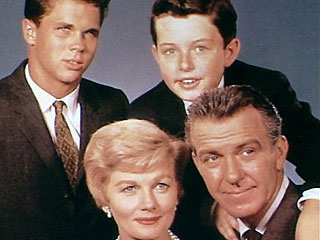
To celebrate Father’s Day, we’ve compiled a list of TV’s best and worst dads. While these dads are completely fictitious, these men have had a heavy influence on the way Americans approach fatherhood. We’ve got representatives from the “aw shucks” 1950s dad to the bumbling idiot dad of the 21st Century. Did we miss a dad you think should have been on the list? Got a beef with the ones that made the list? Make yourself heard in the comments.
TV’s Best Dads
Andy Taylor- The Andy Griffith Show
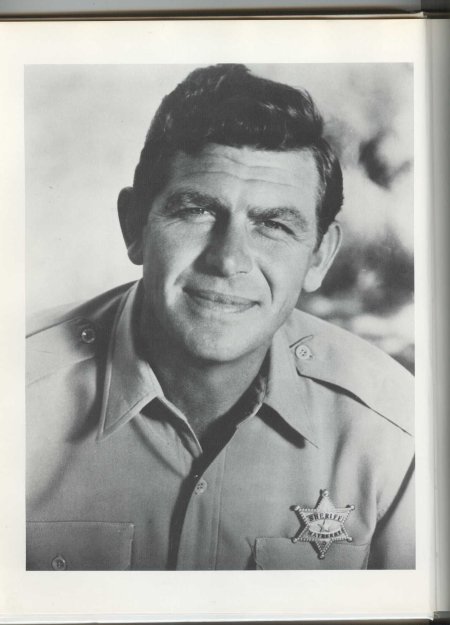
As a single dad, Sheriff Taylor did a fantastic job raising his son Opie. In every episode, Sheriff Andy taught his son and the rest of America one important lesson- do the right thing. Not only did Andy teach little Opie important life lessons, he also made sure to spend plenty of time with him on fishin’ trips.
Homer Simpson- The Simpsons
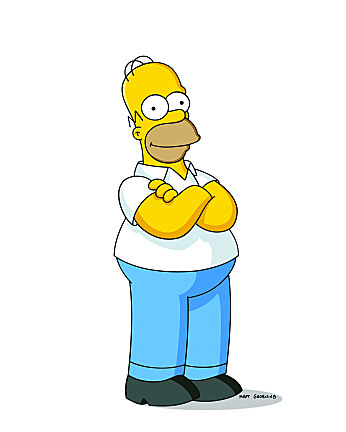
I originally put Homer on the worst TV dad list because he’s a perfect example of television’s now ubiquitous portrayal of the bumbling idiot dad. But I had a change of heart. Sure, he is a poor example of physical health. Sure, he constantly abuses Bart through strangulation. But at the end of the day, the man would do anything for his kids. One of my favorite examples of this was when Homer, unbeknownst to Bart, acted like a robot so Bart could win the Robot war competition. In the process, Homer got bludgeoned and poked with sharp metal objects. Ah, the abiding and hilarious love of a father.
Hank Hill- King of the Hill
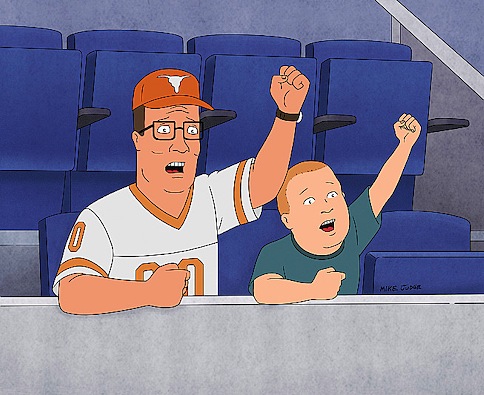
Hank Hill may just sell propane and propane accessories, but he’s the best damn propane seller in Heimlich County. Hank does a fantastic job of teaching his son Bobby the meaning of hard work, dedication, loyalty to friends and family, the importance of Dallas Cowboys football and Texas pride, and of course, the stupidity of political correctness. Yeah, Bobby is awkward, and sometimes Hank is overly concerned about Bobby being a sissy, but he’s always there when Bobby needs him.
Steve Douglas- My Three Sons
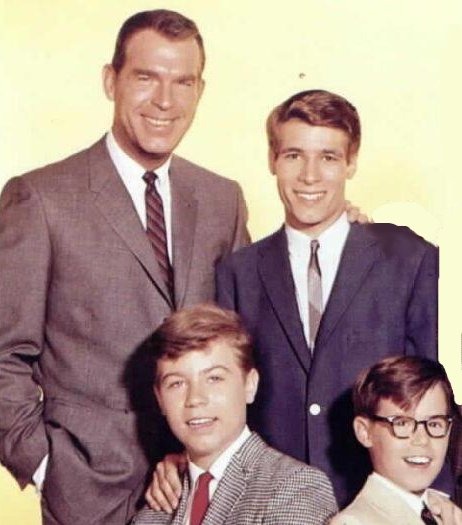
My Three Sons was one of many dad sitcoms from the 1950s and 60s based around a widowed father raising their kids. Steve Douglas was an aeronautical engineer trying to raise three sons first in the Midwest and then in Los Angeles, California. The show ran for 12 years and during that time, America saw Steve’s three sons move out, go to college, and get married. Raising well adjusted and successful family men definitely makes you a great dad.
Ward Cleaver- Leave It To Beaver

Ward Cleaver embodies the stereotypical 1950s dad. Ward might have been idealized, but that doesn’t mean men shouldn’t be inspired to be the kind of father he was. Ward Clever was a businessman that took his job as seriously as his family. Even when frustrated, the man hardly raised his voice. He read Mark Twain to his sons. When he did give bad advice, (like telling the Beaver to get in a fight with a girl) Ward would admit his mistake and teach his sons a lesson in the process.
Dr. Heathcliff Huxtable- The Cosby Show
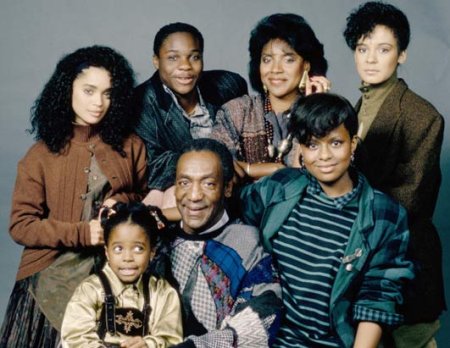
Cliff Huxtable was able to manage raising five kids while being a successful doctor. On top of that, he amassed the most awesome sweater collection in the history of TV fatherdom. Dr. Huxtable’s advice to his children was always based on common sense mixed with a wisecrack. Dr. Huxtable taught his children that personal responsibility is the key to success in life. For example, even though his son, Theo, had dyslexia, Dr. Huxtable still expected him to excel in life and not use his learning disorder as an excuse. If only more dads were like Dr. Huxtable.
Jim Anderson- Father Knows Best
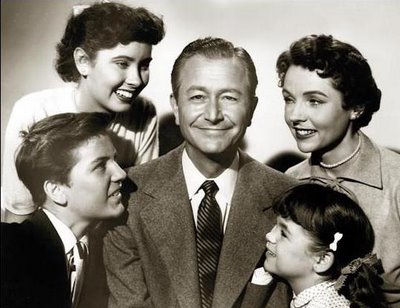
Jim Anderson, the patriarch of this almost perfect 1950s family, was a successful insurance agent at work and a fantastic dad at home. Jim always ended each episode by teaching his children some important moral lesson. The show is a bit campy and isn’t a reflection of what real family life is like, but Jim Anderson is definitely a refreshing portrayal of an American dad when all you see these days are a bunch of dopey fathers on TV.
Mike Brady- The Brady Bunch
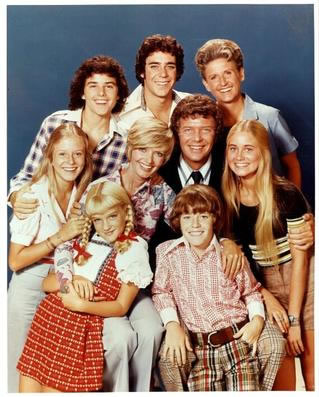
Mike Brady, a widower (another widower!), was faced with the challenge of integrating his three sons with another woman’s brood of three girls. He handled the situation by being both a strict disciplinarian and an empathetic guy. He had a home office/studio in his house so he could work part of the time at home, and even when he went to his real office, he came home around the time the kids returned from school. He won “Father of the Year” on the show after Marcia submitted an essay in his praise to a newspaper. While clearly a stellar dad, Mike gets docked for abandoning his man haircut for a curly perm, and pulling a no-show for Greg’s high school graduation
Eric Camden- 7th Heaven
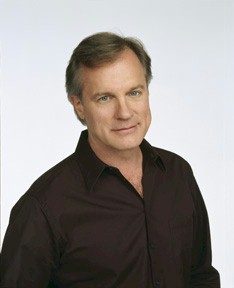
Of all the best TV dads on this list, Eric Camden is the only one who was introduced in the last ten years. Eric was a father to seven children and a minister at a local church where he spent time helping churchgoers and troubled teens. Each episode took on some moral lesson that Eric’s family had to deal with directly or indirectly. Issues like alcoholism, pre-marital sex, and self injury were dealt with on a regular basis. Eric was a good example of a father trying to keep his kids on the right path in a world that’s constantly telling them to go down the wrong one.
Howard Cunningham- Happy Days
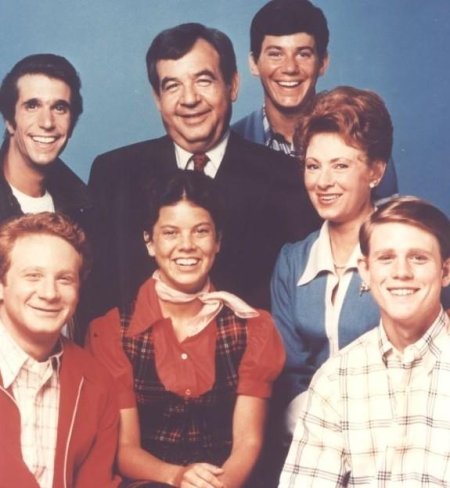
Mr. Cunningham (or “Mr. C.” as the Fonz lovingly called him) was not only the dad to Richie and Joanie Cunningham, but he also acted as a father figure for the Fonz (who Mr. C let move into the family garage), Ralph Malph, and Potsie. He always laid down the law in his house. He was never his kids’ friend, but was always their loving authority figure. Although he loses points for not losing any sleep when his son Chuck disappeared in the second season, in general, Mr. C was a great dad.
TV’s Worst Dads
Tony Soprano- The Sopranos
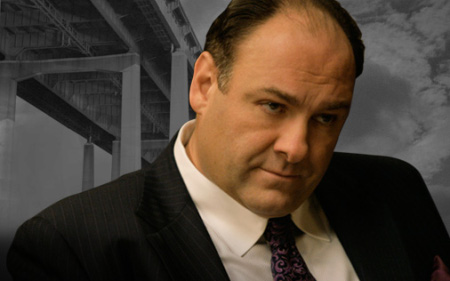
Sure, Tony was able to provide for his family as a “garbage man,” but other than that, the guy was a lousy father. It’s tough to be raised by a professional criminal who knocks off people, including your boyfriend, with little remorse. Tony cheated on his wife and had a strained relationship with his children. As a result, his kids suffered from some serious emotional issues.
Al Bundy- Married With Children
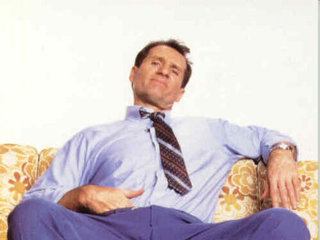
Al Bundy had no redeeming qualities. He was loser who wished he could go back to his high school days when he was a football star. Sitting on the couch with his hand in his pants, he doled out criticism to his family with apathetic aplomb. He was stuck in a dead end job as a shoe salesman, and couldn’t even excel in that capacity. He was up to his ears in debt. His relationship with his kids was poor and his attitude toward women, including his wife, was deplorable. If you want a lesson on how not to be a man, watch Married with Children.
Archie Bunker- All in the Family
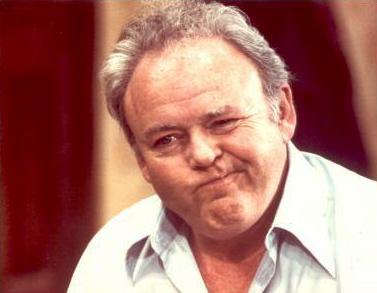
All in the Family was a critically acclaimed show that broke boundaries in regards to race, religion, and gender all thanks to Archie Bunker, the most bigoted old man in television history. Archie pretty much spent his entire time sitting in his living room chair spouting off racial epithets and calling his son-in-law “Meathead.” While Archie started to soften up as the series progressed, he was still pretty much a racist jackass.
Frank Costanza- Seinfeld
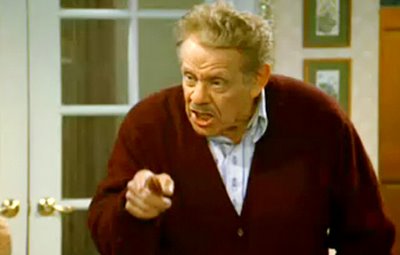
There’s a reason why George Costanza was a paranoid shell of a man- his father, Frank Costanza. Frank Costanza was a loud, neurotic, and abrasive man. Frank always found some way to make George’s life more difficult. In the episode where George Steinbrenner, George’s boss and the owner of the Yankees, comes to tell George’s parents about George’s apparent death, Frank Costanza screams at Steinbrenner for trading Jay Buhner. Thanks dad. Frank Costanza does get points for inventing Festivus, but those points are canceled out by his creation of “the bro.”
Peter Griffin- Family Guy
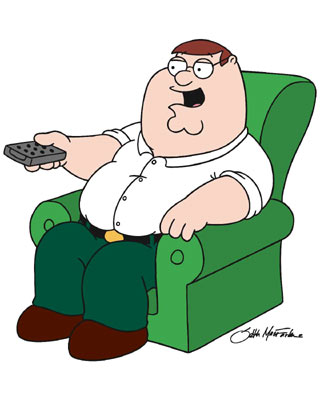
Peter Griffin is a lousy father. He makes fun of Chris, pays no attention to Stewie, and treats Meg like crap. His selling of Meg to pay off a debt at the local drug store is a perfect example of his failure as a dad. A father that sells his daughter into slavery deserves to be hit across the face with the baseball bat. Of course, if that happened to Peter, it would be hilarious. And probably involve some kind of wacky TV sitcom flashback.
John Locke’s Dad- Lost
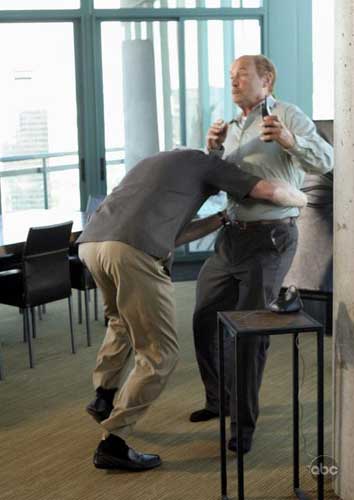
Before the crash of Oceanic Flight 815, John Locke had some serious father issues. First, his dad abandoned him as a child. As an adult, he finally reunites with him, but instead of hugs and tears of joy, John’s dad cons John out of a kidney and then abandons his son once more. Later on, John Locke and his dad cross paths again and Locke is this time greeted with a shove out the window of an eight story building. Consequently, Locke becomes paralyzed. But hey! There’s nothing like being stuck on some mysterious island to work through all these daddy issues!
Arthur Spooner-King of Queens
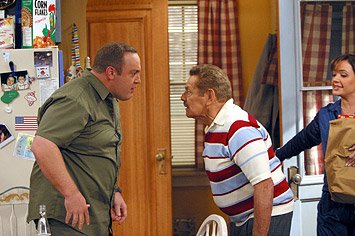
Jerry Stiller makes another appearance on this list as an annoying dad. On King of Queens he plays a dad quite like his character on Seinfeld, albeit with somewhat less yelling. He still loses his temper though and makes life difficult for his daughter Carrie. He lives for free with Carrie and her husband Doug, but never seems grateful for this privilege. Doug and Carrie can seldom get alone time, and when they try to, Arthur makes them feel guilty for it.
Gob Bluth- Arrested Development
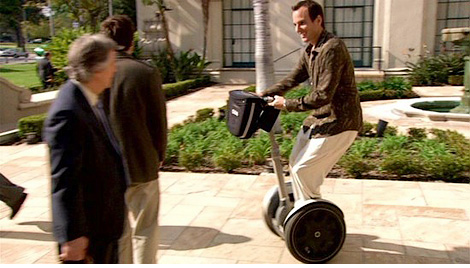
Gob (pronounced like the Biblical character Job) works as a part-time magician and beauty contest judge. He was formally a male stripper, working as one of the “Hot Cops.” During one of Gob’s many one night stands during high school, he unknowingly fathered Steve Holt. Gob doesn’t find out that he’s Steve’s dad until Steve is a senior in high school. Gob doesn’t know how to deal with this new found responsibility and Steve is surely disappointed that his long lost dad scoots about town on a Segway.
Jack Bauer-24
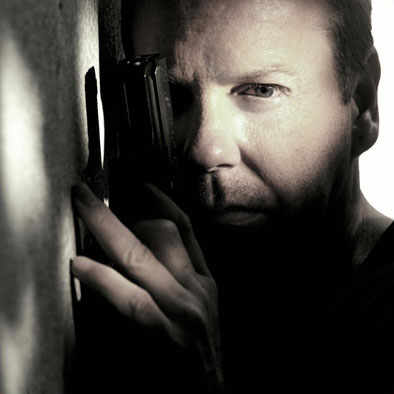
Sure, having a terrorist fighting bad ass for a father would be really cool in many ways. But his passion for his job has enormously detrimental effects on his family. Bauer’s job is to save American lives, but this puts the lives of his family at risk. His own life is always in danger, he’s never at home, his wife Teri is killed, his daughter Kim is kidnapped several times, and her relationship with her dad is understandably strained.
Ray Barone- Everybody Loves Raymond

Ray is a good natured and funny guy, but definitely falls into the “incompetent man-child” stereotype currently dominating the airwaves. He’s not good at communicating, and cracks a joke instead of dealing with things seriously. He’s still tied to his mom’s apron strings and can’t confront her. While he works from home, he doesn’t spend much time with his kids and wife, preferring to watch TV. When he does spend time with his kids, he prefers his twin sons over his daughter. He’s not sure how to relate to her since she’s a girl and so buys her gifts to solve her problems or makes his wife deal with it.
Posted: 13 Jun 2008 12:46 AM CDT

Photo by Tobyotter
This past week we’ve been celebrating Father’s Day by running a series of posts about dear old dad. On Tuesday we asked our readers to share with us lessons imparted by their old man. Whether you were just hoping for an Outback steak or truly wanted to share some of your father’s wisdom, the response was phenomenal. We really enjoyed reading the lessons from your dads; they were both funny and touching. We’ve gone through the comments and have picked out some highlights:
On Manning Up
From Grapfx:
My father taught me to never be idle and keep yourself busy no matter what. Make sure things are fixed and everyone in the house is happy and safe. As sick as he was, he still helped out the neighbors, took care of his pets and raised my nephew. He also taught me about good music, Benny Hill, The Three Stooges, and all good things that are manly.
From Sam:
Whenever I struggled or failed, dad would always tell me “Stuck it up and go.”
From Pentagack:
Admit to your mistakes, even if it’s brutally painful. It’s better to be honest than to have to live with yourself as a liar. Just don’t be an ass or a jerk about being honest - use tact.
From Bryan:
My father showed me through example that it doesn’t matter what mistakes a man makes in life. What matters is if he owns up to them. When starting the quest to become a man your goal should be clear. To be the best that you can possibly be. And no matter how many years pass, no matter how much good you can accomplish you can always do better.
From Bill V:
If you need to be somewhere, but don’t necessarily want to:
- Show up
- Shut up (don’t whine about it)
- Get it over with
- Then do something you want to (redemption)
From Vance R:
When I was about 10 or 11, our Great Dane got out of the yard…I chased her for a few blocks until she stopped and tore up an older man’s pristine flower bed. The man came out and yelled at me, and told me to go get my father and come back to settle the damages. I finally got our dog restrained and took her back home, crying all the way.
I told my Dad the story, and we headed over to talk to the man. I don’t remember what they settled on (it was over 20 years ago), but my Dad calmly defused the situation. When he got back into the car, he taught me something about the art of negotiation and dealing with people while they are angry. Basically, he said in his unique fashion: “That man shouldn’t have started out with his ass on his shoulders.”
I learned that staying calm while arguing really does work out better for everyone. Now that I’m married and have a son of my own, that has come in quite handy…
From Chad:
My dad taught me that if you want something done right, you have to do it yourself. It sure gets tiring, but he was right.
From Ryan:
My father taught me how to fail and persevere. Miss you dad.
From Jen:
My dad once offered my chatterbox sister $5.00 if she could go a whole day without speaking. I started bugging him to let me do it, because I could just go in my room and read with no trouble whatsoever. He said, “No, I’ll give you $5.00 if you can go a full day without feeling sorry for yourself.” I naturally responded, “That’s not fair!” So my sister made it a few hours, whereas I immediately lost my $5.00. So my father taught me not to feel sorry for myself.
From Corey W.:
“Never start a fight, but if someone starts one with you, kick their ass and deal with the consequences later. It will teach them a lesson and show everyone that you are not one to push - because you will push back harder.”
From DPM:
Only I choose who I am and how I act towards others. How they react to me is out of my control, but I am in total control of how I react to them. I choose to treat everyone with respect.
Pay attention to your personal appearance. Every day when I dress, I am choosing how to represent myself to the public. Even casual dress should be done with careful attention.
From Chris:
My dad taught me that it is important to keep a positive attitude, even when things are going wrong because your attitude can have a profound effect on how things turn out. Turning your life around, or making improvements will only occur when you have a positive attitude.
Along those lines, he also taught me that when life is not going your way, it is a sign of weakness to walk around with stooped shoulders, sighing a lot so others will see that you’re not having a good day. This is especially true if you lash out at others and take out your frustrations on them. The only thing you show anyone by behaving this way is that your lack self-control, and have a weak character.
The Love of a Father
From Showtime:
My dad always had one phrase that stuck with me. “You can fix anything but a broken heart.” I remember countless times bringing him a broken toy or action figure with tears in my eyes and then just watching him fix it. He would hand it back and tell me that phrase. Anytime I need help now I just call him up and he has the answer.
From Andrew Barbour:
My own father died about seven years ago, but I’ll share something he did that I will never forget. One Christmas, when I was about seven, I started having my doubts about Santa Claus, so I came up with something vaguely more sophisticated than leaving out milk and cookies and check to see if they had been eaten the next morning. In our fireplace (full of ash, but unlit on Christmas eve of course), I put a bunch of empty plastic gallon milk containers. Santa, if real, would crush them all with his big rear end.
Needless to say, when I came downstairs, all the milk cartons had been crushed into a big butt-shaped dent, and my belief in Santa Claus was impenetrable for the next three years. It never dawned on me during that time that it was my dad that did that.
Even though I don’t celebrate Christmas anymore, I will always remember what my dad taught me, and what I will bear in mind with my own son: It’s worth ruining a pair of pants to indulge your kid’s imagination.
From Barry:
My Dad taught me that your relationships with other people are the most important things in life.
He also showed me what it means to be a father by being there for me every day of my life. He didn’t get drunk or indulge in other vices, he worked his ass off every single day, he told me he loved me every day and gave me hugs every time he came home and before he left. I can now pass on what I have learned to my two boys and help them to grow up to be great Dads.
From DPM:
It is the role of a father to protect and defend his children, rationally. When times get rough when parenting, as they will, a father needs to be calm, learn all the facts, and act lovingly towards his children no matter what. Reacting emotionally and without details is always the wrong choice.
From Another Brandy:
During my teenage years, my dad repeatedly told me that he was my father, not my friend, which seemed to me at the time a completely asinine thing to say. Of course I wouldn’t be friends with such an out-of-touch asshole.
Looking back and comparing where I am emotionally and physically to my friends who had parent-friends, I can see that he was exactly right — and that’s what I strive to be for my children, a parent, not a friend.
Balancing Work and Family
From Corey W.
My father owned his own pharmacy for about 6 years (which he sold for good profit), between my ages of 11 to 17 (prime years for an adolescent). Many weeks he worked a minimum of 60 hours, leaving before the sun came up and always coming home late. However; in all of that, he would always make it to any sporting event or extra-curricular activity that was possible. Never complaining of how tired he was, just showing how proud he was of me. That to me, showed not only how you can balance a career and a family, while remaining successful, but also showed me that hard work and a pure work ethic will take you where you want to be in life
From Dean O.
My dad taught me to leave my work in the office when I come home. Everyday i ask him about work, he always replies, “it just keeps getting better all the time.” It really shows me what’s important (family) and what’s not (your job).
From Pentagack:
It doesn’t pay to be a (fill in your own high earning profession here) at the expense of spending time with your family. My dad is a doctor.
From Shakeel:
Family dinner is not optional. The time to sit down, turn off the TV, and talk about each other’s day, politics, or anything else builds unity like nothing else. If that means that dinner is served at 8:30 or 9:30 every night, so be it.
Relationship Advice
From DPM:
It is the role of a husband to never speak negatively of his wife. Any man who speaks poorly of his spouse to others is declaring himself a fool.
From Dean:
My father once told me, “Don’t ever date a woman whose father called her princess.”
From Pentagack:
Even if you’re not around a whole lot, your kids still have a chance of not getting terribly screwed up if you marry the right woman.
Friday, June 13, 2008
Thursday, June 12, 2008
Father's Day Wisdom From Harvey

From my email today:
Harvey Mackay's Column This Week
Advice from my Dad for Father's Day
There's an English proverb that goes: "One father is worth more than a hundred schoolmasters."
Fathers can teach their children many important lessons. Father's Day is Sunday, June 15, and it brings to mind some of the valuable lessons I learned from my father, Jack Mackay. I've shared many of them with you in my books and columns, but here they are, in one nice package, for the 64.3 million fathers out there.
My dad headed the Associated Press in St. Paul, Minn., for many years. He lived by deadlines. When he told his 10-year-old fishing partner, "Be at the dock at 7:30 a.m." and I arrived at 7:35, I would be holding my fishing pole in one hand and waving bon voyage with the other. Time management 101.
When I began my career selling envelopes, I asked my father how I could make twice as much money as my fellow sales reps.
He asked me how many sales calls my peers made every day. I told him that everyone made about five calls a day, and I could match them call for call.
"No good," he said. "Do what they do and you'll make what they make. Figure out how you can get to 10 calls a day and your income will double."
We worked out a game plan, which became a life plan. I learned when the buyers were in the office and worked according to their schedules, which sometimes meant anytime from 6 a.m.-8 p.m. and Saturday mornings. I quit making cold calls, was among the first to get a cell phone and learned many other time management tips from my father.
TRUST is the most important five-letter word in business and in life. When I was only eight years old, he said: "Son, would you like to learn a lesson that might save your life some day?"
"Sure I would, Dad," I answered.
"Just slide down the banister and I'll catch you," he urged.
I slid ... and landed on the carpet. As I dusted myself off, he announced, "Never trust anyone completely. Keep your eyes open and your wits about you."
Similarly, my father encouraged me at a young age to keep track of all the people I met on Rolodex cards, now on my computer. He was a master networker. He knew where to get stories, much like I learned where to get sales.
Maybe the most important lesson my father taught me was that your best network will develop from what you do best. In my case that was golf. When I joined the sales game after college, where I had been a varsity golfer at the University of Minnesota, my father suggested I join Oak Ridge Country Club, which I couldn't afford. Because Oak Ridge was historically at the bottom of the city golf league, I offered to play for them and try to win them a championship. Six months and numerous meetings later, I was admitted to the club where I gained access to many of the major companies around town.
My father also taught me that the big name on the door doesn't mean diddly. You have to know who the decision makers are.
In addition, he warned me against telling anyone how I vote. That's why it's a secret ballet. The Democrats think I'm a Republican, and the Republicans believe I'm a Democrat.
My father's greatest professional attribute was his nose for a good story and his indefatigable zeal in getting it. He taught me the same desire, determination and persistence for sales.
After a skiing accident that landed me in the hospital for 35 days in neck traction, he told me, "You can take any amount of pain as long as you know it's going to end."
My father taught me many more life lessons, among them:
- They don't pay off on effort . . . they pay off on results.
- No one ever choked to death swallowing his pride.
- He who burns his bridges better be a damn good swimmer.
- Education is like exercise. As soon as you quit you begin to lose the benefits.
- It's hard to soar like an eagle when you're dressed like a turkey.
- If you win say little. If you lose say less.
- We are judged by what we finish, not by what we start.
Mackay's Moral: One person can make all the difference in the world—a father, for example.
Wednesday, June 11, 2008
Update on My Generation
This is Kim Komando's video of the day. Don't think we play this version on ROCK 104:
How to Survive the Recession

I got this in my email yesterday from Seth Godin's blog. I'm running a series on marketing tips from Seth on my Collective Wisdom site which is updated at 7am Eastern time everyday.
This tip, though is for everyone:
Urgent personal finance advice
If I could only share one piece of personal finance advice to grads or to just about anyone, it would be this:
Only borrow money to pay for things that increase in value.
It's a short list: your business, your house and your education, mostly. Stocks if you're smarter than me. That's pretty much it.
If you have credit card debt, you're in big trouble. Your bank account has a huge leak in it, and it's getting worse. Hence the urgency.
If you have credit card debt, that means that every time you spend money (even cash), you're borrowing money to do so. And so, if you're going out to dinner or buying a new pair of shoes, you've just broken the single most important rule of personal finance. You're spending borrowed money on stuff that is decreasing in value.
This is an emergency. It's an emergency because every single day you wait, the problem gets worse. A lot worse.
My suggestion: Go to defcon 1, and do it immediately. Shift gears to live well below your means. That means:
No restaurants
No clothes shopping
No cable TV bill
No Starbucks
It means:
Take in a tenant in your spare bedroom
Carpool to work
Skip vacation this year
Eat brown rice and beans every night for dinner. Act like you have virtually no income.
The result? You'll save $5,000 to $20,000 a year. Send all of it to the credit card company. Do this until you're debt free, the faster the better.
There. Now you're rich. Now you get interest on your savings instead of paying the bank. Twenty years from now, this emergency action will translate into perhaps a million dollars in the bank, depending on how much you earn and how serious you are.
You can thank me then.
Tuesday, June 10, 2008
STRESSED?
Five Simple Ways to Relax at Work When Stress Strikes
Posted: 09 Jun 2008 05:34 PM CDT

"Stress is nothing more than a socially acceptable form of mental illness." - Richard Carlson
Stress sucks. It is one of those things that can sneak up on you at work and explode in terrible and hurtful ways. When stress strikes it is really important to have some simple techniques in your arsenal that allow you to deal with the emotions in the short and long term. This way you can avoid the angry outbursts, sleepless nights and anxious binge trips to KFC that all happen because of stress.
- Find Your Breath One of the most effective and simple ways to deal with stress at work is taken from an ancient Buddhist meditation. It is called "calm abiding" and it is where you bring your attention and focus to the breath coming in and out of your nose. I talk about this a lot in Enlightening Stress Relief, because I believe it is one of the best ways to deal with stress right there in the office.
- Get Sunlight and Wide Open Space
Think about the average office. It is a stress breeding ground. Your eyes are barraged with fluorescent light, your skin is chilled with ducted air conditioning and your ears are constantly being tormented by co-workers, printers and chattering keyboards.
When you spend a lot of the day indoors dealing with the daily grind you lose a lot of perspective. A stressful event seems like the end of the world and you spend the rest of the day (or week!) brooding and thinking about it over and over again. It is like there is nothing else going on in the world.
When you feel like your whole world is becoming engulfed in stress and anxiety one of the simplest things you can do is go outside in the sun in a wide open space. When I was in university and exam stress was getting the best of me I would go to the very top floor of the building which overlooks the whole city with a computer chair and a coffee and just sit in the sun and look at the view.
The effect is wonderfully relaxing.
Sunlight, for starters, has been scientifically proven to make you happier. It causes Vitamin D to be produced in your body and this is a natural anti-depressant.
Secondly, the wide open spaces help you get back some perspective. Overlooking the city at my secret spot used to remind me that there are other people in the world a lot worse off than me, I have a lot to be thankful for and that failing an exam wasn't the end of the world, etc.
Being able to shift your perspective is a wonderful human quality that many people take for granted. Get outdoors to a wide open sunny spot and just slow down and regain some perspective. - Get a Good Green or White Tea
Everyone drinks tea but not everyone knows how amazingly good it is for battling stress. Green and White teas in particular are extremely good for your health. When I was in the Himalayas I was introduced to the relaxing effects of tea by my Tibetan friends and since that time I have used it extensively to calm me down.
In case you don't know there are five main types of tea:- Green Tea
- White Tea
- Oolong Tea
- Black Tea
- Pu Erh Tea
All of these teas come from the same plant but are given different names if they are prepared differently or made from a different part of the plant. Green tea, for example, is fried or steamed to prevent the leaves from fermenting whereas White Tea is made from the buds instead of the leaves. These two teas are said to be slightly more beneficial for stress related problems than the others.
So how does tea help stress?
Tea is full of antioxidants and does wonders for stress levels on many different levels. One study has shown that people who drink tea are actually happier than those who do not. They are also less likely to get cancer and some other serious illnesses.
There are many definitive physiological reasons as to why tea helps stress. Chinese doctors have known it for thousands of years and now western science is backing up those claims with evidence that a cup of tea can suppress a hormone in the body that causes stress.
I always encourage people to drink Dilmah tea as it is known as one of the world's most ethical tea companies and produces the highest quality tea. Dilmah put a lot of money back into the local community and take good care of their workers. They also grow their tea in clean environments which is very important for our health. It is also important not to add any milk to the tea as the proteins in the milk can damage some of the tea's goodness. - Green Tea
- Try Classical Music
A few years ago I discovered how much classical music could help my stress levels. I was driving home from a tough day at work and I changed the radio channel to the local classical mix by accident. Normally I would have changed it right away but that day I heard the inspiring violin of what I now know to be Vivaldi's famous piece called "Winter". I was hooked.
Since that time I have experimented with all of the great classical composers; Mozart, Beethoven, Bach and so on. I have a particular love of Russian classical music which has a very distinct flavor.
Classical music is a really fantastic way to relax when you are feeling stressed and anxious at work. I recommend something that has a smooth violin sound or a melodic piano. Just chuck some on your iPod and listen to it when you feel like the office is starting to get you down. - Just Relax!
A lot of us are addicted to stress. I know that sounds a little silly but in many cases it is true. We are addicted to being depressed and anxious and we have decided that being stressed is normal and therefore do nothing to combat it.
And to make matters worse we go over things again and again in our head. We think that if we think about "why" we are stressed we will come to some lasting solution but in actual fact it just makes it worse. Ever time you think about the stress is just seems to add water into the whirlpool. Thinking about being stressed makes you more stressed!
Ironic.
In these times it is really handy to know the mantra "Just relax!" It sounds simple and probably a little bit silly but it is something you have to try to do. Just relax. Things aren't that bad.
To help you accomplish this I want to share with you a very famous Buddhist teaching by an Indian master called Shantideva. It has helped me deal with stress and worry many times in my life:"If the problem can be solved, why worry? If the problem cannot be solved, worrying will be of no help."
When we look at it logically there really is no reason to stress and worry. Remind yourself of this fact and just relax! It is amazing how powerful this can be if you really want to do it.
The main purpose of calm abiding meditation is to attain a state called "single pointed concentration" where the meditator can focus on any given object for as long as they want without their thoughts wandering away to other areas. Of course, this takes years to master and is not really what we are concerned with here. We are concerned with relieving stress.
Luckily for us, calm abiding meditation has several powerful side-effects and one of them is that i combats stress in a very efficient way - by relaxing the body and mind. Calm abiding meditation is also said to have the ability to heal some minor health problems and will also clear up headaches, neck aches and other stress related issues.
So how do we do it?
All you need to do is sit down and very slowly bring your attention to your breath. Focus on the feeling of the breath going in and out of your nose. If other thoughts enter into your mind just let them pass. Don't judge them or try to force them out. Just notice them and then bring your awareness back to the breath.
Now we are going to count 10 rounds of the breath. A "round" is one inhale and one exhale. This is a lot harder than you think because the stressed mind will jump around like a monkey whose pants are on fire! If you lose count before you get to 10 simply start again.
This meditation is a short term and a long term solution. In the short term it will calm you down and cause anxious thoughts to dissipate and weaken. In the long term it will help you to manage stress and become aware of stressful thoughts as they arise. When you become more aware in this way stress becomes less and less of a dictator and you become more and more in control.
What to do on a rainy day
Monday, June 09, 2008
No Money? No Problem!
6 Things Money Cannot Help you Achieve
Posted: 06 Jun 2008 10:18 AM CDT
 Imagine you are Mr. Bill Gates, czar of the wealth. Life is great; you're the richest man on the earth. You can buy anything in life, right? Wrong. Before you ride on the jet of euphoria and focus your entire life on earning money, know there are simply things that a roll of hundred dollar bills cannot get for you, not even if you are Mr. Gates.
Imagine you are Mr. Bill Gates, czar of the wealth. Life is great; you're the richest man on the earth. You can buy anything in life, right? Wrong. Before you ride on the jet of euphoria and focus your entire life on earning money, know there are simply things that a roll of hundred dollar bills cannot get for you, not even if you are Mr. Gates.If you are perplexed, let me explain my theory. It may sound like an oxymoron but money has its Achilles’ heel. All of our false perceptions about money have one common flaw - they identify money as something external to us, they identify money as the tool to accumulate abundance to please others by accumulating possessions.
What money can't buy mostly lies within us. Nonetheless, trading our life energy for money can deprive us from inner nourishment that can eventually lead our lives into a downward spiral.
1. Time: Money is a tool for trade. With that said, we spend a good chunk of our allotted time on this earth getting, spending, worrying and fantasizing about money. You can't buy the time and save it in your storeroom even if you are Mr. Gates. On the contrary, money takes away your time that could have been spent playing with your children or having a long walk with your alter ego. When the sun sets, a day goes away from our life forever. No money has power to bring that back to life.
2. Self Awareness: Ignorance is bliss, right? It's a curse. Not having self-awareness and self-consciousness lead to decisions that can cost you dearly. Well, the cost may be life itself. As a result, many people live a mediocre life without living for a true purpose. Their ignorance can't be transmuted into awareness with money. They believe that their ignorance is their awareness.
3. Self esteem: I have a plethora of examples to prove that no money can purchase self-esteem. Self-esteem is earned from within. If you are your worst enemy, gods of money can't rescue you from the self-destruction you inflict on yourself. King of rock Elvis Presley had the best life one can imagine with no dearth of cash. He took his own life with the deprivation of self-esteem.
4. Health: As I write this, I found out that Senator Kennedy has brain cancer, and it is terminal. Of course money can get him the best health care possible but no money can buy insurance for a life. We buy insurance for just about everything including our life but money can never bring life back.
5. Respect: Try this. Slap someone on his face and then hand him $100 to get his respect. Will you get it? I doubt it. We all live our life in pursuit of self-respect from peers, from family members, from our alter ego and even from strangers. No money can buy respect from others if our actions speak volumes about our negativity - insult, rudeness and lack of respect for others.
6. Happiness: This is controversial. Money can buy happiness if it is spent on to bring grater financial security for the family. However, money can't buy happiness if the purpose is to make money to make other people happy. The chase of possession of possessions can never find its destination with incessant desire to accumulate more possessions. Happiness comes from within. When we trade so much time and energy to get money, we deprive our inner self from the food of happiness.
I'm sure that you either are nodding you head in disbelief by now, or you've been enlightened by the revelation that, after all, money can't buy some of what matters most in our life. I'll be glad to get a zap or a hug from you.
-Shilpan
Sunday, June 08, 2008
My Space Safety

The following is from Kim Komando's weekend newsletter. You can get a free weekend newsletter, along with your choice of three daily news letters by clicking here.
This weekend Kim included the following excellent information regarding MySpace Safety:
KEEP UP TO DATE WITH MYSPACE DANGERS
I've made it no secret that I don't think any child should have a MySpace account. There are simply too many nutcases in the world. And children, by their very nature, are naïve.
So, you as the adult need to know how to protect your younger family members on MySpace and pass this info on. I made it easy for you. Just click the links below to my top tips about MySpace:
- • The site's dangers and a link to the Dead Kids of MySpace site
• Learn how bullies use MySpace
• Know MySpace's latest threats
• Ammo for parents concerned about MySpace
• Browse all my digital lifestyle parenting tips by clicking here
TAKE THE QUIZ! GIVE THE QUIZ!
Say you have a children who just know everything. They ask you, "What do you know?" After all, you're just the parent.
Have them show you just how smart they are. Have them take the free MySpace Quiz on my site. By the way, almost 90% of kids fail this quiz without seeing the answers at the end.
Copyright © 2008, The Kim Komando Show.
